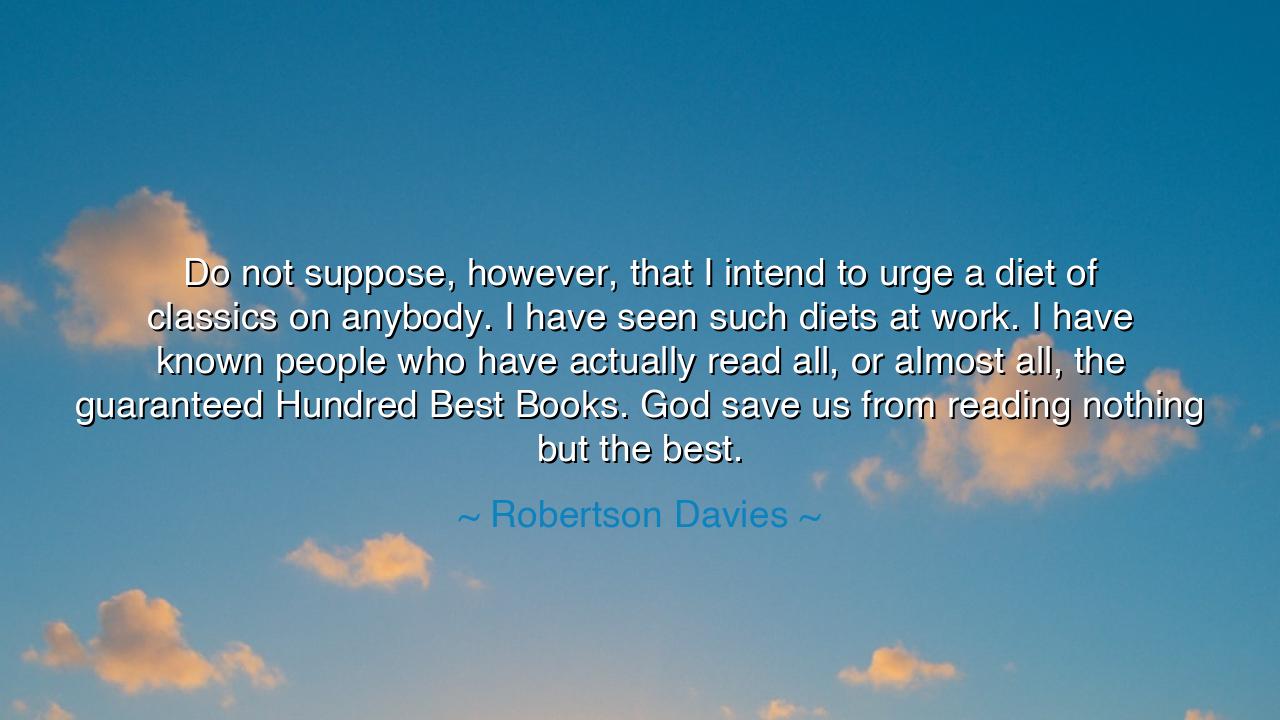
Do not suppose, however, that I intend to urge a diet of classics
Do not suppose, however, that I intend to urge a diet of classics on anybody. I have seen such diets at work. I have known people who have actually read all, or almost all, the guaranteed Hundred Best Books. God save us from reading nothing but the best.






When the wise Robertson Davies declared, “Do not suppose, however, that I intend to urge a diet of classics on anybody. I have seen such diets at work. I have known people who have actually read all, or almost all, the guaranteed Hundred Best Books. God save us from reading nothing but the best.” — he spoke as one who understood both the hunger of the mind and the perils of its excess. His words, though wrapped in wit, echo with ancient wisdom. For he reminds us that even the noblest nourishment, when consumed without discernment, can become poison. Just as the body withers when fed on a single food, so too does the soul grow dull when confined to a single flavor of truth — even if that truth be exalted.
Davies was a man of letters, a scholar of the written word, yet he saw beyond the ivory towers of intellect. His warning was not against the classics, but against worshiping them blindly. For in his time — as in ours — there were those who wore their reading like armor, believing that a shelf full of “great works” could make them wise. But wisdom does not dwell in accumulation; it lives in understanding. To gorge oneself on Homer, Shakespeare, or Milton without tasting the humble voices of the present is to become glutted on greatness — swollen with knowledge, but starved of life.
In this, Davies spoke as the philosophers of old might have spoken. Confucius taught that the “gentleman seeks harmony, not uniformity.” Likewise, Socrates warned that “too much learning without self-reflection breeds arrogance.” Both knew what Davies knew: that wisdom is not found in the perfection of what one reads, but in the balance between learning and living. The “diet of classics” is like a feast of honey — sweet at first, but cloying when taken in excess. The heart becomes weary of excellence, and the mind, trapped in admiration, loses its capacity for wonder.
There is a tale from medieval times of a monk who spent his life copying sacred texts by candlelight. His devotion was pure, yet his world was narrow. One day, a young novice brought him a simple folk tale from the village — a story of love, loss, and redemption. The monk, weary of holy repetition, read it and wept. “I have read the words of saints,” he said, “but only now have I remembered that they speak of men.” The story, though not among the “hundred best,” gave him something the others could not — the warmth of humanity. So too does Davies teach us that not all greatness is gilded, and not all wisdom wears robes of renown.
The origin of Davies’s insight lies in his rebellion against the stiff formalism of academia and cultural elitism. He saw that many who claimed to love literature loved not the living spirit of words, but the status of reading them. They treated books as relics, not as living voices. In this sense, the “diet of classics” becomes an act of vanity — an attempt to appear cultured rather than to be changed. True reading, Davies reminds us, should not imprison the mind in marble halls of perfection, but release it into the wild gardens of curiosity, laughter, and discovery.
His phrase, “God save us from reading nothing but the best,” carries the tone of a prayer and a jest. It is a plea for humility — for the reader to remember that joy, mischief, and imperfection are also teachers. A cheap novel, a folk song, a letter from a friend — these too feed the soul in ways no masterpiece can. For the best is not always what others decree, but what awakens us to life. The measure of a book is not its fame, but its power to stir compassion, to make us think, to make us feel human again.
Thus, the lesson of Davies is not to abandon greatness, but to temper reverence with curiosity. Read the classics, yes — but also read the world. Let the scriptures of your mind be written not only by the wise, but by the humble. Taste the bitter and the sweet, the profound and the foolish, for in this diversity lies wholeness. The soul, like the body, thrives not on purity, but on balance — and the greatest wisdom often hides in the most unassuming words.
So, children of the written word, take this counsel to heart: do not dine only at the tables of kings. Wander the markets of thought; taste the bread of peasants, the laughter of poets, the confessions of fools. For wisdom is not a library, but a life. And when you have read not only “the best,” but also “the rest,” then — and only then — will you have truly fed the soul.






AAdministratorAdministrator
Welcome, honored guests. Please leave a comment, we will respond soon